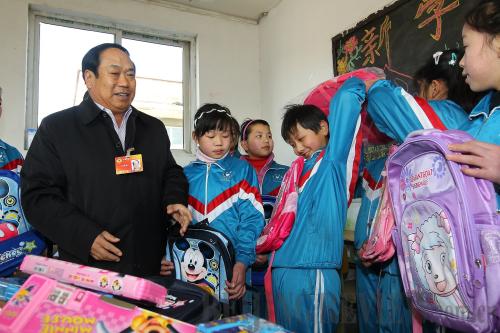|
 |
|
CARING FOR THE KIDS: Gan Lianfang, a member of the 11th National Committee of the CPPCC, goes to a primary school for children of migrant workers in Beijing to do research and gives the students schoolbags and stationery as gifts (XING GUANGLI) |
It is the third year Li Lanjuan, an academician of the Chinese Academy of Engineering and a member of the 11th National Committee of the Chinese People's Political Consultative Conference (CPPCC), has come to Beijing from east China's Zhejiang Province to attend the top political advisory body's gathering. In 2008, she put forward proposals on improving healthcare systems in rural area. In 2009, she moved to set up a national electronic health record for all people. Several months after she raised the proposals, a series of notices and documents were issued by Central Government departments on strengthening rural healthcare systems and now electronic health records have been set up in many cities in China.
"I am so glad to see the fast response of the government to the proposals," said Li. "I am so happy to see that I can do something about the problems that are concerning many people."
Sun Huiling, Deputy Director of Education Bureau in Hexi District of north China's Tianjin Municipality, said she raised a proposal to increase primary and high school teachers' allowance in 2009 and got a reply from the Ministry of Education within two months, a four-page document, analyzing in detail the proposal's feasibility.
Ru Ke, a former chief geologist of the China National Offshore Oil Corp. and an eight-year member of the CPPCC National Committee, said the changes in communication between government departments and the public had been remarkable.
"Eight years ago, we wrote proposals with paper and pen, then we typed and printed it, and this year, we just sent them through the Internet without using any paper," he said.
"All the proposals are posted on the Web and we welcome feedback of netizens. This is big progress."
For Ru, the most important part of writing proposals is the research. "We have a saying that you have 'no say' without any research," Ru said. "I did very careful research for all the proposals I raised." As an example he cited a suggestion on developing marine economy. "I went to five provinces including Fujian, Shandong and Guangxi Zhuang Autonomous Region and stayed for more than one week in each place to get details of the situation."
"The problem now with the proposals is that most of the proposals are raised during the conference, and some members treat it as homework. I think, as CPPCC members, we should always keep our eyes on the problems existing around us and put forward proposals any time they are needed."
Practical proposals
A working report delivered by Luo Fuhe, Vice Chairman of the CPPCC's National Committee on March 3 at the opening meeting of the committee's third session, said a total of 5,820 proposals were submitted last year, and 5,571 of those were filed during the conference last year. Of these, 5,218 were accepted and forwarded to the government department concerned.
More than 1,800 of them were about the maintaining of stable and rapid economic development. These included how to respond to the international financial crisis, expanding domestic demand, improving energy conservation and emission reductions, promoting innovation, advocacy of a low-carbon economy, and conducting coordinated development of rural and urban areas. Many of these proposals were accepted by the government in planning for national policymaking and development.
| 